- Home
- Rick Yancey
The Curse of the Wendigo (The Monstrumologist, Book 2)
The Curse of the Wendigo (The Monstrumologist, Book 2) Read online
THE CURSE OF THE WENDIGO
Also by Rick Yancey
THE MONSTRUMOLOGIST
An imprint of Simon & Schuster Children’s Publishing Division
1230 Avenue of the Americas, New York, New York 10020
www.SimonandSchuster.com
This book is a work of fiction. Any references to historical events, real people, or real locales are used fictitiously. Other names, characters, places, and incidents are products of the author’s imagination, and any resemblance to actual events or locales or persons, living or dead, is entirely coincidental.
Copyright © 2010 by Rick Yancey
All rights reserved, including the right of reproduction in whole or in part in any form.
is a trademark of Simon & Schuster, Inc.
For information about special discounts for bulk purchases, please contact Simon & Schuster Special Sales at 1-866-506-1949 or [email protected].
The Simon & Schuster Speakers Bureau can bring authors to your live event. For more information or to book an event, contact the Simon & Schuster Speakers Bureau at 1-866-248-3049 or visit our website at www.simonspeakers.com.
Book design by Lucy Ruth Cummins
The text for this book is set in Adobe Jenson Pro.
Manufactured in the United States of America
10 9 8 7 6 5 4 3 2 1
Library of Congress Cataloging-in-Publication
Yancey, Richard.
The curse of the Wendigo / William James Henry ; edited by Rick Yancey.—1st ed.
p. cm.—(Monstrumologist ; 2)
Summary: In 1888, twelve-year-old Will Henry chronicles his apprenticeship with Dr. Warthrop, a New England scientist who hunts and studies real-life monsters, as they discover and attempt to destroy the Wendigo, a creature that starves even as it gorges itself on human flesh.
ISBN 978-1-4169-8450-4 (hardcover)
[1. Monsters—Fiction. 2. Supernatural—Fiction. 3. Apprentices—Fiction. 4. Orphans—Fiction.
5. Horror stories.] I. Title.
PZ7.Y19197Cu 2010
[Fic]—dc22
2010019233
ISBN 978-1-4169-8973-8 (eBook)
For Sandy, my light in the darkness
ACKNOWLEDGMENTS
Editing this second set of Will Henry’s journals proved a more daunting task than the first. Historical references abound throughout the folios, all of which had to be checked for accuracy. I am indebted to Jonathan DiGiovanni and copy editor Bara McNeill for their careful and thorough fact-checking of the manuscript.
For their generous help in vetting the languages spoken in the book, thanks to Dr. Sylvie Blum-Reid, Dr. Hana Filip, and Linda Kittendorf.
As with the first volume of The Monstrumologist, Dr. Jeffrey Wilt provided insight into the workings of human anatomy. His unfailing patience and good cheer in the face of a layman’s barely articulate questions were truly invaluable.
My agent, Brian DeFiore, whose enthusiasm for this project seems to have no bounds, was an early reader of the manuscript. Throughout the editing process he offered suggestions for further research and provided guidance when certain avenues of inquiry came to an abrupt dead end. I am lucky to have him as an agent and proud to call him a friend.
I cannot thank my family enough for their amazing patience, understanding and support while I worked on this book. My sons have always been my biggest fans. Thanks, guys.
I owe the most by far to my wife, Sandy, to whom this book is dedicated. Without her love and fierce loyalty, her unflagging devotion and uncompromising honesty, I would be truly lost. She is my best friend.
—The New York Times, December 15, 1897
PROLOGUE
September 2009:
“Cuttings”
The reader was a retired middle school English teacher whose mother had come to live at the facility in 2001. Every week for the next five years, the reader made the thirty-minute drive from Alachua to Gainesville to visit her mother. In clement weather they sat in the same cobblestoned courtyard, nestled between the two main residential buildings of the retirement home, where she now sat with me. A fountain gurgled in the center of the courtyard, ringed on three sides by bistro-style tables that had been painted and repainted to stay the corrosive effects of Florida’s tropical climate. Even now, in late September, the air was thick with moisture and the temperature hovered near ninety—and that was in the shade.
Her mother had passed away in ’06, but the reader still returned each week as a volunteer to read to the residents who either had no family or had family who rarely, if ever, visited. The director of the facility had given me her name and phone number. No, he had told me, to his knowledge the man calling himself William James Henry had not been close to any resident. The only visitor he had had was the volunteer who sat across from me, sipping iced tea from a tall glass in which no ice remained. Perhaps she could help me, the director had said.
“I can’t help you,” the reader told me now.
“He never said anything?” I asked.
“Just his name and the year he was born.”
“1876.”
She nodded. “I’d tease him. I’d say, ‘Now, William, that can’t be the year you were born.’ He would nod—and then he’d say it again.”
“What would he do when you read to him?”
“Stare off into space. Sometimes he’d fall asleep.”
“Did you ever have the impression he was actually listening?”
“That wasn’t the point,” she told me.
“What was the point, then?”
“Companionship. He had no one. Except every Tuesday at two o’clock, when he had me.”
She sipped her tea. The fountain gurgled. The water in its basin dripped off one edge and spattered onto the stones. The fountain had settled several inches on one side into the soft, sandy soil. On the other side of the courtyard, two residents, a man and a woman, sat at another table holding hands, watching—or appearing to watch—the play of light in the cascading water. She nodded in their direction.
“Well, for a while he had her, too.”
“‘Had’ her? Who is she?”
“Her name is Lillian. She was William’s girlfriend.”
“His girlfriend?”
“Not just his. Since I’ve been coming here, she’s had about twelve boyfriends.” The reader gave a little laugh. “She has Alzheimer’s, the poor thing, goes from man to man, sticks to them like glue for a few weeks, and then she loses interest and ‘picks up’ somebody else. The staff calls her ‘the Heartbreaker.’ Some of the residents take it very hard when she moves on.”
“Did William?”
She shook her head. “It’s hard to say. William was . . .” She searched for the word. “Well, sometimes I thought he might be autistic. That it wasn’t dementia at all but something he had been suffering from his entire life.”
“He wasn’t autistic.”
She looked away from Lillian and Lillian’s companion to study me, arching an eyebrow. “Oh?”
“After he died, they found some old notebooks hidden under his bed. A kind of diary or memoir that he must have written before he came here.”
“Really? Then you know more about him than I do.”
“I know what he wrote about himself, but I don’t know anything about him,” I said carefully. “I’ve only read the first three notebooks, and it’s . . . well, pretty far out there.” Her stare was making me uncomfortable. I shifted in my chair and looked across the courtyard at Lillian. “Would she remember him?” I wondered aloud.
“I doubt it.”
“I guess
I should ask,” I said without much enthusiasm.
“They would sit together for hours,” the reader said. “Not talking. Just holding hands and staring off into space. It was sweet in a way, if you didn’t think about the inevitable.”
“The inevitable?” I assumed she was talking about death.
“The next one catching her eye. That one she’s sitting with now? His name is Kenneth, and she’s been with him about a month. I give it another week, and poor Kenneth will be all alone again.”
“How did Will take it—when she dumped him?”
The reader shrugged. “I didn’t notice it affecting him in any way.”
I continued to watch Lillian and her beau for another minute.
“Doesn’t mean it didn’t,” I said.
“No,” she said. “It doesn’t.”
That same afternoon I met with Will Henry’s attending physician, the man who had declared him dead on the night of June 14, 2007. He had treated Will since his arrival at the facility.
“You know,” he said with a twinkle in his eye, “he claimed he was born in 1876.”
“So I’ve heard,” I said. “How old do you think he actually was?”
“Hard to say. Mid- to late nineties. In excellent shape, though, for someone his age.”
“Except the dementia.”
“Well, dementia is inevitable, if you live long enough.”
“What was the cause of death?”
“Old age.”
“Heart attack? Stroke?”
“One of the two, most likely. Hard to tell without an autopsy. But he passed his last physical with flying colors.”
“Did you ever find . . . Was there any indication of . . . maybe something odd about his . . . Can you tell me if you ever took a blood sample?”
“Of course. It was part of the physical.”
“And did you ever find anything . . . unusual?”
The doctor cocked his head quizzically, and I had the impression he was fighting back a smile.
“As in?”
I cleared my throat. Spoken aloud, the idea seemed even more ridiculous. “In the journals, Will Henry talks about being, uh, infected by some kind of parasite when he was around eleven or twelve. An invertebrate like a tapeworm, only much smaller, that somehow gives people unnaturally long life.”
The doctor was nodding. For a split second I misinterpreted the nod as an assent, an indication that he had heard of such a symbiotic creature. And, if that portion of Will Henry’s fantastic life story were true, what else might be? Could it be that there was such a discipline as monstrumology practiced in the late nineteenth century by men such as his guardian, the brilliant and enigmatic Pellinore Warthrop? Was it possible that I had in my possession not a work of fiction but a memoir of a truly extraordinary life that spanned more than a century? The central question, the thing that woke me in the dead of night shivering in a cold sweat, the notion that haunted me as I fought to go back to sleep . . . Could monsters be real?
My hope—if what I was feeling could be called that—was short-lived. The doctor’s nod was not to signify recognition; it was his way of being polite.
“Wouldn’t that be nice?” he asked rhetorically. “But no, his blood was perfectly normal. A bit high on the bad cholesterol. Other than that . . .” He shrugged.
“What about a CT scan or an MRI?”
“What about them?”
“Did you ever give him one?”
“The state won’t fund unnecessary procedures in a case like Mr. Henry’s. My job was to make his last days as comfortable as possible, and that’s what I did. Do you mind if I ask you a question? Where are you going with this?”
“You mean why does it matter?”
“Yes. Why?”
“I’m not sure. I guess part of it is the mystery. Who was this guy? Where did he come from, and how did he end up in that culvert? And why did he write that journal or novel or whatever it is? I guess the main reason, though, has to do with a promise I made.”
“To Will Henry?”
I hesitated. “I was talking about the director. He gave me the journals and asked me to read them, to see if there might be clues that will help us find his relatives. Somewhere there must be someone who knew him before he came here. Everyone has someone.”
The doctor was smiling. He got it. “And for now you’re the only someone he has.”
I dropped the notes of my interviews with the reader and the doctor into the ever-expanding file I was keeping on Will Henry, and then I dropped the file into a drawer with yet another promise to myself that I wasn’t going to obsess; I would work on it as my schedule permitted. I had a deadline on a book, familial obligations, worries of my own. The old leather-bound books with their cracked hides and yellowing pages remained undisturbed in a stack beside my desk. I was publishing the first three under the title of The Monstrumologist the following year in the hopes that some reader somewhere might recognize something familiar in them.
It was a long shot. For legal reasons the notebooks would have to be presented as fiction. Even if someone recognized the name of William James Henry, it would be taken as a coincidence, but something in his tale might spark a memory; perhaps he had thrilled his children or grandchildren with the story of the bizarre and horrifying creatures called Anthropophagi. He had obviously been an educated man. Perhaps at some point in the distant past he had even published something, maybe not under his own name—if, that is, William James Henry was his name. After he’d been discovered in the drainage ditch, the police had run his fingerprints. The person claiming to be William James Henry had never been arrested, had never served in the military, and had never held any job where registering his fingertips was required by law.
I thought, if those first three notebooks were a work of fiction—and, given the subject matter, they would have to be—then the author, in his demented state, might have come to identify so closely with his protagonist that he became Will Henry. Odder things have happened to flaky writers.
I had spent the entire summer trolling the Internet, making calls, interviewing everyone I could think of who might have that one special nugget of information, that heretofore undiscovered key that would unlock the truth from the stubborn confines of the past.
Late in September, while I sat at my desk suffering from yet another severe case of writer’s block, my eye wandered to the journals. Impulsively I pulled out the fourth volume and flipped it open to a random page. To my astonishment, a newspaper clipping slipped onto the desktop.* My heart racing with excitement, I thumbed through the entire volume, finding other scraps of paper tucked between the pages, as if the journal had served a dual purpose as Will Henry’s diary and as his scrapbook.
Over the next three days I found more memorabilia tucked between the pages of the remaining journals. I began a new file, which I labeled “Cuttings,” organized by their location in the journals (in other words, by volume and page number), with notes outlining possible avenues for more research. While I can vouch for the authenticity of some of them (the New York Times articles, for example), others, like the calling card of Abram von Helrung, have yet to be fully vetted. I cannot say with 100 percent certainty that they are not forgeries or part of some very weird creative exercise on the part of the journals’ author.
R.Y.
Gainesville, Florida
September 2009
* Reproduced in the front matter of this book.
“Logic sometimes breeds monsters.”
—Henri Poincaré
FOLIO IV
Desolation
“FOR THE PANIC OF THE WILDERNESS HAD CALLED TO HIM IN THAT FAR VOICE—THE POWER OF UNTAMED DISTANCE—THE ENTICEMENT OF THE DESOLATION THAT DESTROYS.”
—ALGERNON BLACKWOOD
ONE
“What Am I, Will Henry?”
I do not wish to remember these things.
I wish to be rid of them, to be rid of him. I set down the pen nearly a year ago, swearing I would
never pick it up again. Let it die with me, I thought. I am an old man. I owe the future nothing.
Soon I will fall asleep and I will wake from this terrible dream. The endless night will fall, and I will rise.
I long for that night. I do not fear it.
I have had my fill of fear. I have stared too long into the abyss, and now the abyss stares back at me.
Between the sleeping and the waking, it is there.
Between the rising and the resting, it is there.
It is always there.
It gnaws my heart. It chews my soul.
I turn aside and see it. I stop my ears and hear it. I cover myself and feel it.
There are no human words for what I mean.
It is the language of the bare bough and the cold stone, pronounced in the fell wind’s sullen whisper and the metronomic drip-drip of the rain. It is the song the falling snow sings and the discordant clamor of sunlight ripped apart by the canopy and miserly filtered down.
It is what the unseeing eye sees. It is what the deaf ear hears.
It is the romantic ballad of death’s embrace; the solemn hymn of offal dripping from bloody teeth; the lamentation of the bloated corpse rotting in the sun; and the graceful ballet of maggots twisting in the ruins of God’s temple.
Here in this gray land, we have no name. We are the carcasses reflected in the yellow eye.
Our bones are bleached within our skin; our empty sockets regard the hungry crow.
Here in this shadow country, our tinny voices scratch like a fly’s wing against unmoving air.
Ours is the language of imbeciles, the gibberish of idiots. The root and the vine have more to say than us.
I want to show you something. There is no name for it; it has no human symbol. It is old and its memory is long. It knew the world before we named it.
It knows everything. It knows me and it knows you.

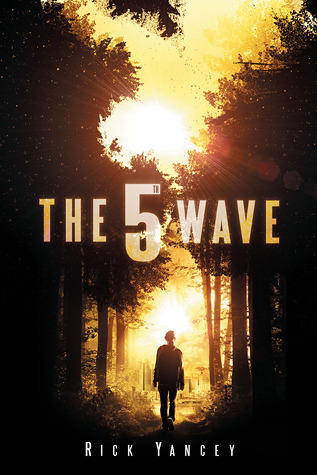 The 5th Wave
The 5th Wave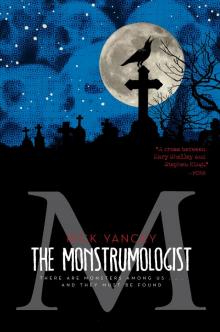 The Monstrumologist
The Monstrumologist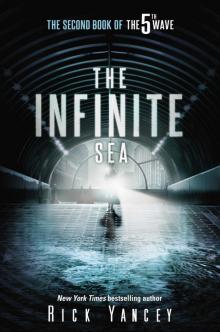 The Infinite Sea
The Infinite Sea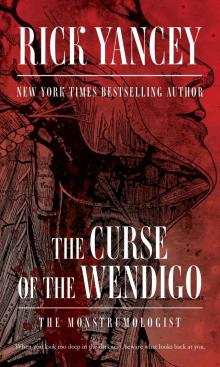 The Curse of the Wendigo
The Curse of the Wendigo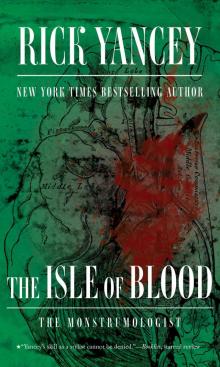 The Isle of Blood
The Isle of Blood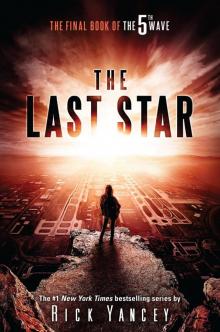 The Last Star
The Last Star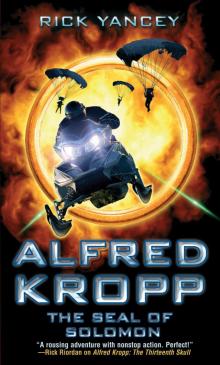 The Seal of Solomon
The Seal of Solomon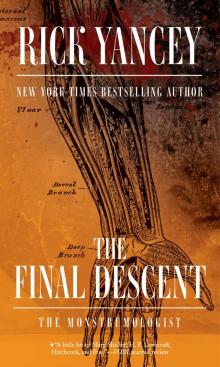 The Final Descent
The Final Descent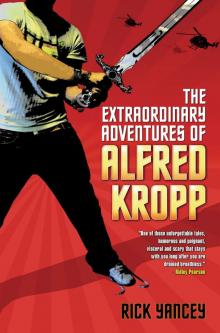 The Extraordinary Adventures of Alfred Kropp
The Extraordinary Adventures of Alfred Kropp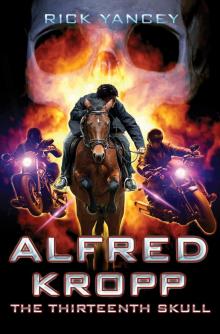 The Thirteenth Skull
The Thirteenth Skull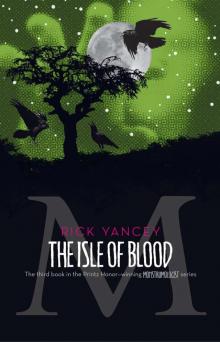 The Isle of Blood (Monstrumologist)
The Isle of Blood (Monstrumologist)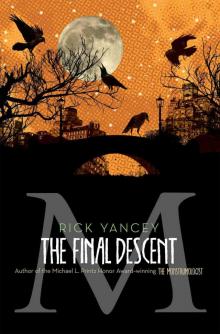 The Final Descent (The Monstrumologist)
The Final Descent (The Monstrumologist)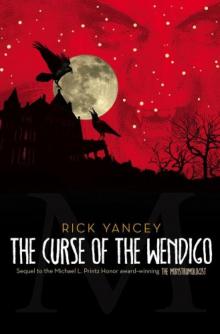 The Curse of the Wendigo (The Monstrumologist, Book 2)
The Curse of the Wendigo (The Monstrumologist, Book 2)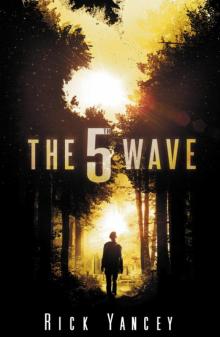 The 5th Wave t5w-1
The 5th Wave t5w-1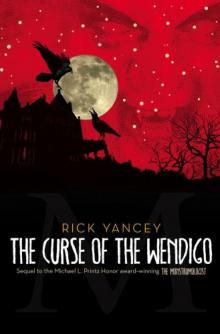 The Curse of the Wendigo (The Monstrumologist, Book 2) m-2
The Curse of the Wendigo (The Monstrumologist, Book 2) m-2